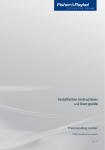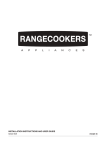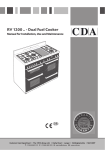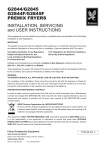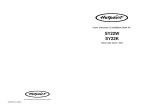Download Fisher & Paykel OR120 User's Manual
Transcript
Installation instructions and User guide Freestanding cooker OR120 double oven models GB IE Contents Safety and warnings Installation instructions Maintenance instructions Introducing your cooker Using your cooktop Cooktop troubleshooting Using your ovens for the first time Clock and timer Using your oven Cooking functions Automatic cooking Using the warmer drawer Care and cleaning Warranty and service Important! SAVE THESE INSTRUCTIONS The models shown in this User Guide may not be available in all markets and are subject to change at any time. For current details about model and specification availability in your country, please visit our local website listed on the back cover or contact your local Fisher & Paykel dealer. 1 2 6 13 16 17 21 22 23 24 25 27 28 29 42 2 Safety and warnings Installation WARNING! Electrical Shock Hazard Always disconnect the cooker from the mains electricity supply before carrying out any maintenance operations or repairs. Failure to do so may result in death or electrical shock. WARNING! Cut Hazard Take care - panel edges are sharp. Failure to use caution could result in injury or cuts. Important safety precautions General To avoid hazard, follow these instructions carefully before installing or using this product. Please make this information available to the person installing the product as it could reduce your installation costs. Installation must comply with your local building and electricity regulations. Failure to install the cooker correctly could invalidate any warranty or liability claims. Some appliances have a protective film. Remove this film before using the cooker. Electrical This cooker is to be installed and connected to the electricity supply only by an authorised person. If the installation requires alterations to the domestic electrical system, call a qualified electrician. The electrician should also check that the electrical system is suitable for the electricity drawn by the cooker. The appliance must be connected to the mains, checking that the voltage corresponds to the value given in the rating plate and that the electrical cable sections can withstand the load specified on the plate. A suitable disconnection switch must be incorporated in the permanent wiring, mounted and positioned to comply with the local wiring rules and regulations. The switch must be of an approved type installed in the fixed wiring and provide a 3 mm air gap contact separation in all poles in accordance with the local wiring rules. The switch must always be accessible. The power supply cable must not touch any hot parts and must be positioned so that it does not exceed 75 OC at any point. Safety and warnings To connect the cooker to the mains, do not use adapters, reducers or branching devices as they can cause overheating and burning. This cooker must be connected to a suitable double pole control unit adjacent to the cooker. No diversity can be applied to this control unit. The cooker must be earthed. Gas This cooker is supplied for use with natural gas only, and cannot be used on any other gas without modification. See the ‘Maintenance instructions’ for modification to other gas types. This cooker can only be installed in a room with adequate ventilation. See the ‘Provision for ventilation’ instructions in the installation instructions following . 3 4 Safety and warnings Operation Your freestanding cooker has been carefully designed to operate safely during normal cooking procedures. Please keep the following guidelines in mind when you are using it: WARNING! Explosion Hazard Do not store flammable materials such as gasoline near the cooktop. Do not store flammable material in the ovens or in the drawers. Do not spray aerosols near the cooktop during use. Failure to do so may result in death or serious injury. WARNING! Electrical Shock Hazard Switch the cooker off at the wall before replacing fuses or the oven lamp. Failure to do so may result in death or electrical shock. WARNING! Hot Surface Hazard Accessible parts may become hot when this cooker is in use. To avoid burns and scalds keep children away. Do not touch hot surfaces inside the ovens or warmer drawer. Use oven mitts or other protection when handling hot surfaces such as oven shelves or dishes. Take care when opening the oven doors. Let hot air or steam escape before removing or replacing food. Do not touch the cooktop components, burners, trivets/pan supports or the base when hot. Before cleaning, turn the cooker off and make sure it is cool. Failure to do so could result in burns and scalds. Safety and warnings 5 Important safety precautions Isolating switch: make sure this cooker is connected to a circuit which incorporates an isolating switch providing full disconnection from the power supply. Household appliances are not intended to be played with by children. Children, or persons with a disability which limits their ability to use the appliance, should have a responsible person to instruct them in its use. The instructor should be satisfied that they can use the appliance without danger to themselves or their surroundings. Safe food handling: leave food in the oven for as short a time as possible before and after cooking. This is to avoid contamination by organisms which may cause food poisoning. Take particular care during warmer weather. Do not place aluminium foil, dishes, trays, water or ice on the oven or warmer drawer floor during cooking as this will irreversibly damage the surface. Do not line the walls with aluminium foil. Do not stand on the doors, or place heavy objects on them. Do not use harsh abrasive cleaners or sharp metal scrapers to clean the oven door glass since they scratch the surface, which may result in shattering of the glass. Do not use a steam cleaner to clean any part of the cooker. Do not use an asbestos mat or decorative covers between the flame and the saucepan as this may cause serious damage to your cooktop. Do not place aluminium foil or plastic dishes on the cooktop burners. Do not let large saucepans or frying pans overlap the bench as this can deflect heat onto your benchtop and damage the surface. Do not let large saucepans, frying pans or woks push any other pans aside. This could make them unstable or deflect heat onto your benchtop and damage the surface. Saucepan handles may be hot to touch. Ensure saucepan handles do not overhang other gas burners that are on. Keep handles out of reach of children. If the electrical supply cord is damaged, it must only be replaced by an authorised person. This cooker is not to be used as a space heater. The use of a gas cooking appliance results in the production of heat and moisture in the room in which it is installed. Ensure the kitchen is well ventilated. Keep natural ventilation holes open or install a mechanical ventilation device (mechanical extractor hood). Prolonged intensive use of the appliance may call for additional ventilation, for example opening of a window, or more effective ventilation, for example increasing the level of mechanical ventilation where present. 6 Installation instructions mm MAX 927 mm MIN 915 mm 120 mm 600 1200 mm Fig. 1 Location The installation conditions, concerning protection against overheating of the surfaces adjacent to the cooker, must conform to Fig.3a or 3b. The appliance must be kept no less than 200 mm away from any side wall which exceeds the height of the hob surface (Fig. 3a or 3b). The appliance must be housed in heat resistant units. The walls of the units must be capable of resisting temperatures of 75 °C above room temperature. Do not install the appliance near flammable materials (eg. curtains). If the cooker is located on a pedestal, provide safety measures to prevent it falling out. Assembling the backguard A It is mandatory to install the backguard Assemble the backguard as shown in Fig. 2 and fix it by screwing the five screws “A”. Fig. 2 Installation instructions 500 mm 450 mm minimum 650 mm minimum Class 1 200 mm minimum Gas connection made using rubber hose which must be visible and easily inspected or using rigid or flexible metal pipe. m minimu m 20 m Fig. 3a m 20 m Class 2 500 mm 450 mm minimum 650 mm minimum Subclass 1 200 mm minimum m minimu 0 mm 0 mm Fig. 3b Gas connection made using rigid or flexible metal pipe. 7 8 Installation instructions Levelling the cooker Important! Using the supplied adjustable feet is MANDATORY. For safety reasons and to ensure adequate ventilation, the cooker chassis MUST NOT sit directly on the floor, a plinth, or other support surface. The cooker is already fitted with six levelling feet. Level the cooker by screwing or unscrewing the feet (Fig. 4d). Make sure you follow the instructions in Figs. 4a, 4b, and 4c. Fig. 4a 0 mm Note: bolts are supplied with the cooker in a separate kit. + 8 mm + 8 mm + 12 mm Fig. 4b Fig. 4c Fig. 4d Installation instructions 9 Moving the cooker Important! Two people must always raise the cooker, as shown, to prevent damaging the adjustable feet. Do not lift the cooker by the door handles. DO NOT DRAG the cooker. Lift the feet clear of the floor. Fig. 5a Correctly raising the cooker Ventilation requirements (GB & IE only) The appliance should be installed in a room or space with an air supply in accordance with BS 5440-2:2000. For rooms with a volume of less than 5 m3 : permanent ventilation of 100 mm3 free area will be required. For rooms with a volume of between 5 m3 and 10 m3 : permanent ventilation of 50 cm3 free area will be required unless the room has a door which opens directly to the outside air, in which case no permanent ventilation is required. For rooms with a volume greater than 10 m3 : no permanent ventilation is required. Fig. 5b Incorrectly moving the cooker Fig. 5c Incorrectly raising the cooker Note: regardless of room size, all rooms containing the appliance must have direct access to the outside air via an openable window or equivalent. Where there are other fuel burning appliances in the same room, BS 5440-2:2000 should be consulted to determine the correct amount of free area ventilation requirements. 10 Installation instructions Gas installation (GB & IE only) Important! This cooker uses NATURAL GAS only and cannot be used on any other gas without modification. This appliance is manufactured for conversion to LPG if required. If the injectors are not supplied they can be obtained from the After-Sales Service. Installation and service regulations Important! This appliance must be installed and serviced only by a suitably qualified and registered person, and in accordance with the current editions of the following standards and regulations or other locally applicable regulations: Gas Safety (Installation and Use) Regulations Building Regulations British Standards Regulations for Electrical Installation Failure to install the appliance correctly could invalidate any manufacturer’s warranty and lead to prosecution under the above-quoted regulation. Gas connection The installation of the cooker to Natural Gas or LP Gas must be carried out by a qualified gas engineer. Installers shall take due account of the provisions of the relevant British Standards Code of Practice, the Gas Safety Regulations and the Building Standards (Scotland) (Consolidation) Regulations issued by the Scottish Development Department. Note: It is recommended that the gas connection to the cooker is installed with a flexible connecting tube made to BS 5386. Installation to Natural gas Installation to Natural Gas must conform to the Code of Practice, etc. The supply pressure for Natural Gas is 20 mbar. Installation to Liquid Petroleum gas This appliance must only be connected to LPG after an LPG conversion kit has been fitted. The installation must conform to the relevant British Standards. Important! Only a suitably qualified and registered person may convert the appliance to a different gas type. When using Butane gas a supply pressure of 28 -30 mbar is required. When using Propane gas a supply pressure of 37 mbar is required. Installation instructions 11 Notes: Flexible hoses can be used where the sited ambient temperature of the hose does not exceed 70°C. These hoses must be manufactured in accordance with BS669 part 1 and be of the correct construction for the type of gas being used. Gas hoses designed for natural gas MUST NOT be used for supplying LPG gas (LPG gas hoses can be identified by a either a red band or stripe on the rubber outer coating of the hose). The hose should not be crushed or trapped or be in contact with sharp or abrasive edges. It should also not be subjected to corrosion by acidic cleansing agents. IMPORTANT! Fig. 6a Do not use a naked flame to test for leaks. Cooker manifold Manifold male pipe fitting 1/2” G cylindrical (ISO 228-1) male 10 mm 4 10 mm 3 20 mm 2 To connect the gas supply: Fit the 1/2” BSP (female) connector (supplied with the cooker in a separate kit) to the gas inlet at the rear of the cooker interposing the gasket. Check the correct positioning of the connector as shown and always use two suitable spanners (Fig 6b). Connect the gas supply to the gas inlet at the rear of the cooker. If the pipe has to cross the cooker, it must be positioned under the protected area of the cooker (see Fig 6a) To avoid damage to the appliance gas rail inlet pipe tighten the fittings using two suitable spanners (Fig. 6b). Using a suitable leak detection fluid solution (e.g. Rocol) check each gas connection one at a time by brushing the solution over the connection. The presence of bubbles will indicate a leak. If there is a leak, tighten the fitting and then recheck for leaks. 20 mm 1 Gasket (*) 1/2” G cylindrical (ISO 228-1) female Connector (*) 1/2” BSP (female) (*) Supplied with the appliance in a separate kit. Fig. 6b 12 Installation instructions Connecting the feeder cable To connect the feeder cable to the cooker: Remove the four screws that hold shield “A” behind the cooker. Open the cable clamp “D” completely. Check the position of the U bolts on the terminal block “B” (Fig. 7a) according to the diagram in Fig. 7b and Fig. 7c. Insert the feeder cable into the cable clamp “D” and into the cable protector “C”. The supply cable must be of a suitable size for the current requirements of the appliance; see ‘Feeder cable section’ following. Connect the phase and earth cables to terminal “B” according to Figs. 7b and 7c. Pull the feeder cable and block it with the cable clamp “D”. Re-mount shield “A”. Note: the earth conductor must be left about 30 mm longer than the others. B C A D Fig. 7a 1 2 3 L1 4 5 N(L2) PE Red or or Brown Brown (Live) Green Green and and Yellow Yellow (Earth) (Earth) Black Black or Blue or Blue (Neutral) (Neutral) Fig. 7b Feeder cable section “TYPE H05RR-F” 230V (**) 2 3 x 2.5 mm (**) - Connection with wall box connection. 230 V 1 2 3 4 5 L1 N (L2) PE PE N L Earth Neutral Live Fig. 7c Maintenance instructions Semi-rapid burner Replacing the burner injectors J If the injectors are not supplied, contact the Fisher & Paykel Authorised Service Centre. Select the injectors to be replaced according to the ‘Table for the choice of injectors’. Fig. 8a Triple ring wok burner To replace the injectors: Remove pan supports and burners from the cooktop. Using a wrench, substitute the nozzle injectors “J” (figs. 8a - 8b - 8c) with those most suitable for the kind of gas used. The burners are designed so that adjustment of primary air is not required. J Fig. 8b Dual burner J Injector for inner crown J Injectors for outer crowns Fig. 8c 13 14 Maintenance instructions Setting the burner minimum F Check whether the flame spreads to all burner ports when the burner is lit with the gas tap set to the minimum position. If some ports do not light, increase the minimum gas rate setting. Check whether the burner remains lit even when the gas tap is turned quickly from the maximum to the minimum position. If the burner does not remain lit, increase the minimum gas rate setting. To adjust the minimum gas rate setting: Semi-rapid and triple ring wok burners Light the burner. Set the gas valve to position. Remove the knob. Using a thin screwdriver, pass by the hole of microswitch and turn the screw “F” until adjustment is correct (Fig. 9a). Inside crown of DUAL burner Light the DUAL burner. Set the gas valve to position. Remove the knob. Using a screwdriver, turn the screw “H” until the correct setting is obtained (Fig. 9b). Outside crowns of DUAL burner Light the DUAL burner. Set the gas valve to position. Remove the knob. Using a screwdriver, turn the screw “G” until the correct setting is obtained (Fig. 9b). For G30/G31 gas, tighten the adjustment screws completely. Fig. 9a H G Fig. 9b Maintenance instructions 15 Table for the choice of the Injectors Cat: II 2H 3+ GB IE BURNERS Nominal Power [kW] Reduced Power [kW] Semi-rapid 1,75 Triple ring wok G 30 - 28-30 mbar G 31 - 37 mbar G 20 20 mbar Ø injector [1/100 mm] 0,45 32 65 97 (Z) 3,50 1,50 65 95 135 (T) inner crown 1,00 (*) 0,32 (*) 27 50 (no. 1 central outer crown 4,50 (#) 1,90 (#) 60 66 (no. 2 outer) Dual (*): Power calculated with inner crown operating. (#): Power calculated with inner and outer crowns operating. By-pass [1/100 mm] adjustable By-pass [1/100 mm] Ø injector [1/100 mm] 69 (F1) (no. 1 central 102 (Z) (no. 2 outer) Fig. 6 Lubrication of the gas taps A qualified technician must lubricate the gas taps. Important! All installation, maintenance and conversion of the appliance must be done using original factory parts. The manufacturer declines any liability if these correct parts are not used. 16 Introducing your cooker Thank you for buying a Fisher & Paykel freestanding cooker. Once it is installed and ready to use, you will want to know everything about it to make sure you get excellent results right from the start. This guide introduces you to all its special features. We recommend you read the whole guide before using your new cooker, for both safety and cooking success. For more information, go to www.fisherpaykel.com 11 7 10 8 9 18 1 2 3 15 17 4 5 6 14 16 12 13 Fig. 10 Cooker control panel 1 2 3 4 5 6 7 8 9 10 11 Gas cooking hob controls: Front left triple ring wok burner control knob Rear left semi-rapid burner control knob Central left dual burner control knob Central right dual burner control knob Rear right semi-rapid burner control knob Front right triple ring wok burner control knob Left oven controls: Function selector control knob Temperature selector control knob Control buttons Clock display Oven temperature indicator light 12 13 14 15 16 Right oven controls: Function knob Temperature knob Control buttons Clock display Oven temperature indicator light Warming drawer (left drawer only) controls: 17 Warming drawer control knob 18 Warming drawer on indicator light Using your cooktop 1 1 . 2 1 2 3 Semi-rapid burner Triple-ring wok burner Dual burner 3 3 2 Fig. 11 Cooktop layout Gas burners The knob controls the flow of gas through the safety tap. = closed valve = maximum aperture or flow = minimum aperture or flow You can choose to cook at any heat between and , but never between 0 Fig. 12 Burner control knob and OFF. 17 18 Using your cooktop Before using your cooktop Before using your new cooktop, please: Read this user guide, taking special note of the ‘Safety and warnings’ section. Make sure all controls are turned off. Lighting the cooktop 1 2 3 Choose the control knob for the burner you want to use. Press the knob down gently and turn it anticlockwise to the position. The ignitors on all the burners will spark. Hold down the knob for approximately 10 seconds after the burner has lit. Releasing the knob too soon will extinguish the flame. Adjust the flame anywhere between the and positions. Do not adjust the flame between and OFF. Note: if the burner does not light within 15 seconds, turn the control knob off and wait at least one minute before trying again. To switch the burner off, turn the knob clockwise until you hear the safety click. After use, always turn the knobs to the off position. Flame failure safety feature The flame failure probe cuts off the gas supply to the burner if the flame is blown out. When lighting the burner on flame failure models, hold down the knob for approximately 10 seconds after the burner has lit. Releasing the knob too soon will extinguish the flame. If the flames are accidentally extinguished, turn off the burner and do not try to light it again for at least one minute (to allow the gas to disperse). Using the dual gas burners . The dual burner is a very flexible burner. It has one inner and two outer crowns. The inner crown can be controlled separately from the flames of the outer crowns. Fig. 13 Dual crown burners Using your cooktop 19 The dual burner can be used as: a small burner, with the flame only from the inner crown. as a high powered burner, with flames from both the inner and outer crowns. To change from using the inner crown only to using both the inner and outer crowns together, press the control knob down before turning it. You have to do the same when going from using both crowns to using just the inner crown. To use the inner crown, adjust the flame anywhere between the flame between and OFF. and . Do not adjust the To use the inner and outer crowns together, adjust the flame anywhere between the and . If the cooktop does not light If the cooktop does not light, check that: The cooker is switched on. The gas is turned on. You have held down the knob for at least 10 seconds. The ignitors are sparking. If the ignitors are not sparking, they may be dirty or wet. Clean them with a toothbrush and methylated spirits, as shown. Ignitor Flame failure probe Fig. 14 Cleaning the probe and ignitor If the flame is irregular If the flame is yellow or irregular, check that the burner parts, including the burner cap, are: clean and dry. positioned correctly. See ‘Care and cleaning’. See also ‘Troubleshooting’. 20 Using your cooktop Choosing a burner Use flat-bottomed pans, and make sure that they match your burner, as shown in the following table. A small pot on a large burner is not efficient. Diameters of pans which may be used on the cooktop Burners Minimum Maximum Semi-rapid 16 cm 24 cm Dual crown 26 cm 28 cm Triple ring wok 26 cm 28 cm Maximum diameter for wok pans: 36 cm Fig. 15 Correct and incorrect matching Fig. 16 Efficient and inefficient saucepan bottoms Wok stand Fig. 17 Correct placement of wok stand Important! Place the wok stand as shown. Always use the wok stand for wok cooking. Do not use the wok stand for other saucepans. Only use the wok stand on the dual or triple-ring wok burners. Cooktop troubleshooting Problem Possible solutions My cooktop burners do not light. Check the cooker is switched on. Check the gas supply valve is turned on and the supply to the house is working. You should hear the gas when you turn a burner on. The ignitors may be dirty. Clean them with a toothbrush and methylated spirits. The burner parts may not be located properly. Check the assembly and make sure the burner cap is sitting flat. My burner flames are yellow or hard to start. The burner parts may not be located properly. Check the assembly and make sure the burner cap is sitting flat. If you use bottled gas, this may indicate you are getting near the end of the bottle. Check the burner parts are clean and dry. The gas pressure may not be at the correct level. Check with your service person or installer. Your cooker may not be set up for the gas you are using. Check this with your service person or installer. One of my burners has an uneven flame. Check the burner parts are clean and dry. Check the assembly and make sure the burner cap is sitting flat. The flame goes out at low settings. The gas supply pressure may be low. Check this with your service person or installer. The low setting may have been adjusted incorrectly. Check this with your service person or installer. My burners do not turn down much (when running on bottled gas or LPG). Your cooktop may not have been adjusted correctly. Check this with your service person or installer. The flame tips are very yellow. Call your service person to service the cooker. There are objectionable odours. Call your service person to service the cooker. The flame appears to lift off the burner. Call your service person to service the cooker. There is an electricity failure. If there is an electricity failure, you can still use your cooktop. Light the burners by holding a match close to the side of the burner and turning the control knob to the High position. Wait until the flame is burning evenly before adjusting. 21 22 Using your ovens for the first time Clock display Function knob 1 2 3 4 5 Temperature knob Control buttons Fig. 18 Control panel Before using your new oven, please: Read this user guide, taking special note of the ‘Safety and warnings’ section. Remove all accessories and packaging. Set the clock. The oven will not work until the clock has been set. Condition the oven: Put in the shelves and trays. Fit them between the metal runners, with the safety stop notch down and at the back. (If the shelf supports are not already fitted, see ‘Care and cleaning’ for how to do this). Heat the oven on maximum for: 60 minutes in the position 30 minutes in the position 15 minutes in the position Wipe out the oven with a damp cloth and mild detergent, and dry thoroughly. Fig. 19 Correct position of shelves and pan Clock and timer 23 Buttons Timer Cooking time End of cooking time Manual position; and cancels the set program Decreases the number shown on the display or changes the volume of the beeps Increases the number shown on the display Fig. 20 Clock display and control buttons Illuminated symbols AUTO - flashing - oven in automatic position but not set AUTO - steady illumination - oven set for automatic cooking - timer in operation AUTO - flashing and timer beeping when you have set automatic cooking time program error (The time of day lies between the calculated cooking start and end time.) Setting the clock When first connected, or after a power failure longer than 15 seconds, ‘0.00’ and AUTO will flash on the display. To set the clock, press the button and then the and buttons. Note: changing the time will delete any automatic program. Using the timer You can use the timer at any time, even when the oven is not in use. The timer does not turn the oven off. You can set the timer for up to 23 hours and 59 minutes. To set the timer, press the button briefly, then the and buttons to set the time you want. After a few seconds, the clock will show the time of day with the symbol in the display. button. To check the remaining time, press the To cancel the timer, press the button and then reset the time to ‘0.00’ by pressing the button. Press the button to turn the timer off. When the time is up, the timer will beep. Press the button to turn the timer off. Setting the timer volume 1 2 3 You can choose between three levels of volume for the timer beeps. To adjust the volume: Check the clock is set and the timer is not running. Press and hold the button. The timer will beep. Release the button and re-press to hear the next level of volume. The last level selected is stored. Note: if the power to the oven is cut, then the beep volume will reset to the loudest level. 24 Using your oven Fig. 21 Function knob 1 2 3 Fig. 22 Temperature knob Select the function using the function knob. The oven lights will come on. Select the temperature using the temperature control knob. The oven temperature indicator light, above the temperature knob on the control panel, will glow until the oven has reached the set temperature, and then it will go out. When you have finished cooking, turn the function and temperature control knobs to the off O position. Note: press the button if AUTO is flashing or steadily illuminated. Cooking functions 25 OVEN LAMP Only the oven light comes on. It remains on in all the cooking functions. BAKE The upper and lower heating elements come on. BAKE is the traditional method of cooking. It is best to cook on only one shelf at a time in this function. GRILL The grill at the top of the oven comes on. Preheat for five minutes. Use with the oven door closed and the temperature knob between 50 °C and 225 °C max. Do not grill for longer than 30 minutes at any one time. For best results, use the topmost shelf position when you want quick browning (eg toast). DEFROST Only the oven fan comes on. Use with the temperature knob set to O. The fan circulates air around the oven, speeding up the defrosting process by approximately 30%. Note: this function is not for cooking food. FAN FORCED The circular heating element and the fan come on. The oven set on FAN FORCED can cook several different foods together. Use FAN FORCED for multi-shelf cooking. FAN GRILL Both the grill and the fan come on. Use with the oven door closed and the temperature knob between 50 °C and 225 °C max. WARM The upper element, the circular element and the fan come on. Set between 50 OC and 140 OC. Note: this function is not for cooking food. 26 Cooking functions FAN BAKE The upper and lower heating elements and the fan come on. Important! Safe food handling: leave food in the oven for as short a time as possible before and after cooking or defrosting. This is to avoid contamination by organisms which may cause food poisoning. Take particular care during warmer weather. Notes on baking and roasting: Only use the fat filter for roasting. Remove before baking. Always clean the filter after cooking. Preheat the oven before baking. Do not place anything, including water or ice, on the oven floor. Fig. 23 Fat filter Automatic cooking 27 Use automatic cooking to automatically turn the oven on, cook, and then turn the oven off. 1 2 3 4 5 Check the clock shows the correct time. Select the function and temperature. The oven will come on. Decide how long the food will take to cook, allowing time for preheating if necessary. Press the button. 0.00 will show. AUTO will also show when you start using the buttons to set the cooking time. Select the time you would like the oven to turn off by pressing the button, and then using the buttons. If there is time to wait before cooking starts, the current time of day and AUTO will show in the clock display. The oven temperature and function lights will go out and the oven will switch off but is now set for automatic cooking. If you are already at home to turn the oven on and only want the oven to turn off automatically, start cooking as normal, then follow step 4 or step 5 to set a time to stop the oven. When automatic cooking starts, AUTO will continue to show and the oven will turn on. To see the remaining cook time, press the button. To see the set stop time, press the button. To cancel automatic cooking at any time, press the button and turn the temperature and function knobs to the off O position. When the stop time is reached, the oven will turn off, the timer will beep and AUTO will flash: Press the button to stop the beeping and return the oven to manual mode. Turn the temperature and function knobs to the off O position. Important! Safe food handling: leave food in the oven for as short a time as possible before and after cooking. This is to avoid contamination by organisms which may cause food poisoning. Take particular care during warmer weather. 28 Using your warmer drawer Before using your warmer drawer, please: Condition it by heating it on maximum for about two hours. Wipe it out with a damp cloth and mild detergent, and dry thoroughly. Important! Always start with hot food. Safe food handling: leave food in the oven for as short a time as possible before and after cooking or defrosting. This is to avoid contamination by organisms which may cause food poisoning. Take particular care Fig. 24 Warmer drawer knob and indicator light during warmer weather. Do not place food in unopened containers as these may burst. Do not use plastic containers. Do not line the drawer with aluminium. The warmer drawer is on the left-hand side. You can heat it from 30 OC to 120 OC. It also has a moisture control selector. Moisture selector MOIST To use the moisture selector To keep food moist, slide the selector to the left. This closes the vents. To keep food crisp, slide the selector to the right. This opens the vents. DRY Left drawer Reversible rack Position the reversible rack as shown in the following Fig.s. Fig. 26a Fig. 25 Fig. 26b Care and cleaning Important! Before you start cleaning your cooker, please: Read these cleaning instructions and the ‘Safety and warnings’ section at the start of this user guide. Turn the cooker off at the wall. Make sure the cooker is a safe temperature to touch. Do not use a steam cleaner. Do not keep flammable substances in the ovens or drawers. General advice Wipe out the ovens after every use. Wipe up spills. Avoid leaving alkaline or acidic substances (such as lemon juice or vinegar) on the oven surfaces. Do not use cleaning products with a chlorine or acidic base. Cleaning the outside of the cooker Important! Do not use abrasive cleaners, cloths or pads on the outside surfaces of the cooker. Immediately wipe off any caustic cleaners if they are spilled onto the oven door handle. Wipe the cooker’s outside surfaces often, using warm water and a mild household detergent. The stainless steel may also be cleaned with a suitable cleaner and polish. Note: if you choose to use a commercial stainless steel cleaner, please read the label to make sure it does not contain chlorine compounds as these are corrosive and may damage the appearance of your cooker. Cleaning the gas cooktop Maintenance Period Daily Monthly Description • Clean gas cooktop as per following instructions. • Remove all burner parts, and clean using a non-abrasive detergent. Rinse in cold water, dry thoroughly, and replace. • Clean the ignitor and probe carefully, using a toothbrush Every 3-4 years and methylated spirits. • Contact your local authorised gas Service Agent to perform a thorough check on all gas components on the gas cooker. 29 30 Care and cleaning Burner parts and pan supports You can remove and clean these parts with hot soapy water or non-abrasive detergents. Clean spills regularly before they become burnt on. Do not wash these parts in a dishwasher. After cleaning, check that the burners and their flame spreaders are dry before replacing correctly. It is very important to check that the burner flame spreader and the cap have been correctly positioned. Failure to do so can cause serious problems. Note: to avoid damage to the electric ignition, do not try to light the cooktop when the burners are not in place. Replacing the burners Check that: The ignitor is always clean to ensure trouble-free sparking. The probe is always clean to ensure correct operation of the safety valves. Note: both the ignitor and probe must be very carefully cleaned using a toothbrush and methylated spirits. Cap Flame spreader Probe Ignitor Fig. 27 Semi-rapid burner parts Fig. 28 Replacing the semi-rapid burners Care and cleaning Replacing the triple-ring wok burner To replace the wok burner, fit the burner ring to the housing as shown by the arrow in the Fig. following. Make sure the burner is not able to rotate. Probe Ignitor Fig. 30 Replacing the triple-ring wok burner Fig. 29 Triple-ring wok burner parts 31 32 Care and cleaning Correct position of dual burners The DUAL burner must be correctly positioned; the burner rib must be fitted as shown by the arrows. Position the central small cap in its housing as shown by the arrows. Position the big cap in its housing as shown by the arrows. Important! Fig. 31a Fitting the burner rib Never unscrew the burner screws. Gas valves If you have problems with the gas valves, call your Authorised Service Centre. Fig. 31b Positioning the central small cap Fig. 31c Positioning the big cap Fig. 31d Do not unscrew burner screws Care and cleaning 33 Cleaning the inside of your ovens Do not use abrasive cleaners, cloths or pads to clean the enamel. Fig.32 Removing the side racks Fig.33 Drop-down grill element To make cleaning easier, you can remove the side racks, the oven door, and the fat filter. Once you have removed the side racks, the top grill element also drops down to make cleaning easier. The grill element is self-cleaning. 34 Care and cleaning Cleaning the enamel cavity Clean the enamel on the inside of the oven when it has cooled down, using household detergents or an ammonia-based cleaner. You may use ‘off the shelf’ oven cleaners, if you carefully follow the manufacturers’ instructions. Cleaning the fat filter Clean the fat filter after every use. If the filter is not cleaned, it will block and shorten the life of the fan element. If it is lightly soiled, place the filter in a dishwasher on normal wash. If the filter is very dirty, place in a saucepan with either two tablespoons of clothes washing powder, or one tablespoon of dishwashing powder. Bring to the boil and leave to soak for at least 30 minutes. Rinse the filter in clean water and dry. Fig.34 Fat filter Care and cleaning 35 Cleaning the oven door glass Do not use harsh abrasive cleaners or sharp metal scrapers to clean the oven door glass since they scratch the surface, which may result in shattering of the glass. The oven door has three panes of glass. To clean these, you need to remove the inner and middle panes. Fig.35a Removing the inner and middle panes of glass A 1 Lock the door open: Fully open the oven door (Fig. 35a). Fully open the lever “A” on the left and right hinges (Fig 35b). Gently close the door (Fig. 35c) until the left and right hinges are hooked to part “B” of the door (Fig. 35b). B Fig.35b 2 Remove the inner pane: Remove the seal “G” by unhooking the three fixing hooks (Fig. 35d). Gently pull out the inner pane of glass (Fig. 35e). Clean the glass with an appropriate cleaner. Dry thoroughly, and place on a soft surface. Fig.27 Fig.35c G Fig.35e Fig.35d 36 3 Care and cleaning Remove the middle pane: Gently unlock the middle pane of glass from the bottom clamps by moving it as in Fig. 36b. Gently lift the bottom edge of the pane (arrow 1 in Fig. 36c) and remove it by pulling it out from the top clamps (arrow 2 in Fig. 36c). Clean the glass with an appropriate cleaner. Dry thoroughly, and place on a soft surface. Fig.36a Now you can also clean the inside of the outer glass. Fig.36b 1 2 Fig.36c Care and cleaning 37 Replacing the middle and inner panes of glass 1 2 Make sure the door is locked open (see Figs 35a - 35c). Replace the middle pane: Check that the four rubber pads are in place (“M” in Fig. 37a). Check that you are holding the pane the correct way. You should be able to read the wording on it as it faces you. Gently insert the top edge of the pane into the top clamps (arrow 1 in Fig. 37b), then lower the pane and insert the bottom edge into the bottom clamps (arrow 2 in Fig. 37b); and then slide the pane into position (Fig. 37c). M Fig.37a 1 2 1 Fig.37b Fig.37c 38 3 4 Care and cleaning Replace the inner pane: Check that the four rubber pads are in place (“D” in Fig. 38a). Check that you are holding the pane the correct way. You should be able to read the wording on it as it faces you. Insert the pane in the left “E” and right “F” slide guides (Fig. 38b), and gently slide it to the retainers “H” (Fig. 38c). Replace the seal “G” by hooking in the three fixing hooks. Make sure that you put it in the correct way. (Fig. 38e). Unlock the oven door by opening it completely and closing the lever “A” on the left and right hinges (Fig. 38d). D Fig.38a E F Fig.38b H Fig.38c G A Fig.38e Fig.38d Care and cleaning 39 Removing the oven door(s) The oven door(s) can easily be removed as follows: Open the door to the full extent (Fig. 39a). Open the lever “A” completely on the left and right hinges (Fig. 39b). Hold the door (Fig.39c). Gently close the door until left and right hinge levers “A” are hooked to part “B” of the door (Fig. 39d) Withdraw the hinge hooks from their location following arrow “C” (Fig. 39e). Rest the door on a soft surface. Fig.39a A To replace the door, repeat the above steps in reverse order. B Fig.39b Fig.39c C Fig.39e Fig.39d 40 Care and cleaning Removing the drawers 1 2 3 Open the drawer completely (Fig. 40a). Move the lever of the left guide down and move the lever of the right guide up. Remove the drawer, while still holding the levers. Important! Warming drawer (left drawer only): Do not remove drawer while hot. Do not remove drawer during operation. Be sure drawer is empty before removing. 3 Fig.40a Removing the drawers Replacing the drawers 1 2 Fig.40b Replacing the drawers Insert the drawer guides into the range guides (Fig. 40b). Gently close the drawer completely; the safety catches will automatically hook. Note: make sure you put the drawers back on the correct side. The left (warmer) drawer is uncoated stainless steel. Care and cleaning 41 Replacing the oven lamp Let the oven cavity and the heating elements cool down. Remove the protective cover “B”. Unscrew and replace the bulb “A” with a new one suitable for high temperatures (300°C) with the specifications: 230-240V 50 Hz, 25W, E14 Refit the protective cover, “B”. Note: oven bulb replacement is not covered by your warranty. A B Fig.41 Removing the oven lamp 42 Warranty and service Before you call for service or assistance ... Check the things you can do yourself. Refer to the installation instructions and your user guide and check that: 1 2 Your product is correctly installed. You are familiar with its normal operation. If after checking these points you still need assistance, please refer to the Service & Warranty book for warranty details and your nearest Authorised Service Centre, or contact us through our website: www.fisherpaykel.com This cooker has been designed and constructed in accordance with the following codes and specifications: In Europe: Safety requirements of EEC Directive “Gas” 90/396 GB - EN 30-1-1 - EN 30-2-1 - EN 437 Safety requirements of EEC Directive “Low voltage” 2006/95: - EN 60335-1 General Requirements for Domestic electrical appliances - EN 60335-2-6 Particular Requirements for Domestic electrical cooking appliances Safety requirements of EEC Directive “EMC” 89/336: - EN 55014-1, EN 55014-2, EN 61000-3-2, EN 61000-3-3 Electromagnetic Compatibility Requirements IE Requirements of EEC Directive 93/68. European directive 2002/96/EC on Waste Electrical and Electronic Equipment (WEEE) (for European Union countries only) GB This appliance is marked according to the European directive 2002/96/EC on Waste Electrical and Electronic Equipment (WEEE). By ensuring this product is disposed of correctly, you will help prevent potential negative consequences for the environment and human health, which could otherwise be caused by inappropriate waste handling of this product. The symbol on the product, or on the documents accompanying the product, indicates that this appliance may not be treated as household waste. Instead it shall be handed over to the applicable collection point for the recycling of electrical and electronic equipment. Disposal must be carried out in accordance with local environmental regulations for waste disposal. For more detailed information about treatment, recovery and recycling of this product, please contact your local city office, your household waste disposal service or the shop where you purchased the product. Copyright © Fisher & Paykel 2009. All rights reserved. The product specifications in this booklet apply to the specific products and models described at the date of issue. Under our policy of continuous product improvement, these specifications may change at any time. You should therefore check with your Dealer to ensure this booklet correctly describes the product currently available. www.fisherpaykel.co.uk www.fisherpaykel.ie GB IE Freestanding cooker user guide Published: 07/2009 Part No. 599456 C F&P Italy Part No. 1103068 - ß3


















































